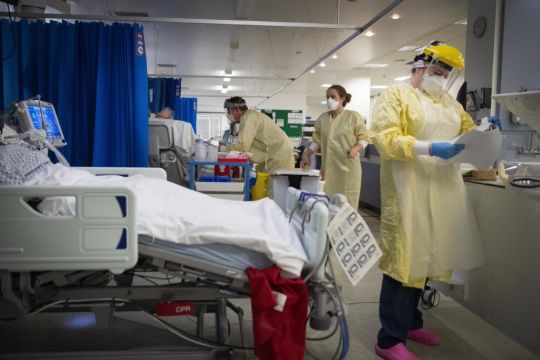Ireland’s health chief has said the health service is dealing with an “extraordinary national crisis” as healthcare workers fight to save the lives of those with Covid-19 in attempts that are not always successful.
Speaking at a weekly update on the HSE’s pandemic response, Paul Reid said reaching the milestone of more than 1,000 people in hospital with Covid-19 must be a “call to arms to the public to support the health service in the coming weeks and months”.
However, the HSE chief added there were early signs that the spread of the virus was being curtailed by the country's lockdown, which began in late December and has since been tightened after a spike in infections.
He described "early signs of reducing numbers of cases, a reducing growth rate of the number of cases, and reducing number of contacts" that people were reporting to have in the days prior to diagnosis.
Frontline healthcare workers were nonetheless seeing “very worrying signs” of a return to the situation they faced in spring, consultant in infectious diseases Clíona Ní Cheallaigh warned.
Frontline worker
Also speaking at the briefing, Dr Ní Cheallaigh, who is currently working on a Covid-19 ward in St James’s Hospital in Dublin, said the first wave of the pandemic was “incredibly difficult” for workers witnessing the suffering of Covid-19 patients and their families.
“We don’t want to go back,” she said, but added that healthcare workers are “expecting it to get worse before it gets better.”
I would certainly be very happy to never have to live through something like that again
“I would certainly be very happy to never have to live through something like that again,” she added.
Dr Ní Cheallaigh said units for cardiothoracic and burns patients were currently being converted into intensive care units for Covid-19 patients, which meant cancelling operations such as valve replacements which people had been waiting on for a long time.
She described “young, healthy people in great difficulty breathing,” requiring large amounts of oxygen. She added that those who recover from the virus can be traumatised by the experience of not being able to breath.
Disturbing
The HSE’s chief clinical officer, Dr Colm Henry, said it was not yet clear if the number of hospitalisations by mid-January would be closer to the health service's optimistic scenario of 1,500 or the pessimistic scenario of 2,500.
He said the different scenarios had major implications for the quality of care that patients would receive and for the outcomes that would be seen.
The “great bulk” of intensive care had been delivered in conventional settings during the first wave of the pandemic, he added, which meant Ireland saw better outcomes for its patients than many other European countries.
Hospital occupancy had now exceeded the first surge and had not yet peaked, with 1,022 people hospitalised with the virus and 95 in intensive care.
Dr Henry described current “disturbing” figures in terms of referrals for Covid-19 testing from GPs.
If you think you have Covid, you more than likely do
Amid high levels of the virus circulating in the community, he said 40 to 50 per cent of tests were returning as positive.
“The message is: if you think you have Covid, you more than likely do,” Dr Henry said.

Dr Henry said the R value, which indicates the average number of people a confirmed case of the virus is likely to infect, was now estimated to be in excess of 2.
The five-day moving average was now seeing 5,525 new cases of the disease each day, while the country’s 14-day incidence rate, which was previously below 200, was now above 800 — a number higher than the UK and the 10th highest in Europe.
Mr Reid said “good progress” had been made in the talks with private hospitals to provide extra capacity and urged them to “put on the green jersey at a time of national need”.
There are currently 400 general beds available in the system, he said.







